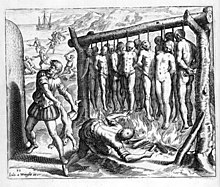Portal:Genocide
The Genocide PortalGenocide is the intentional destruction of a people in whole or in part. In 1948, the United Nations Genocide Convention defined genocide as any of five "acts committed with intent to destroy, in whole or in part, a national, ethnical, racial or religious group". These five acts were: killing members of the group, causing them serious bodily or mental harm, imposing living conditions intended to destroy the group, preventing births, and forcibly transferring children out of the group. Victims are targeted because of their real or perceived membership of a group, not randomly. The Political Instability Task Force estimated that 43 genocides occurred between 1956 and 2016, resulting in about 50 million deaths. The UNHCR estimated that a further 50 million had been displaced by such episodes of violence up to 2008. Genocide is widely considered to be the epitome of human evil. Genocide has been referred to as the "crime of crimes". (Full article...) Selected article The Genocide of indigenous peoples is the mass destruction of entire communities or races of indigenous peoples. Indigenous peoples are understood to be people whose historical and current territory has become occupied by colonial expansion, or the formation of a state by a dominant group such as a colonial power. While the concept of genocide was formulated by Raphael Lemkin in the mid-20th century, the earlier expansion of various European colonial powers such as the Spanish and British empires, and the subsequent establishment of colonies on indigenous territory, frequently involved acts of genocidal violence against indigenous groups in the Americas, Australia, Africa and Asia. According to Lemkin, colonization was in itself "intrinsically genocidal". He saw this genocide as a two-stage process, the first being the destruction of the indigenous population's way of life. In the second stage, the newcomers impose their way of life on the indigenous group. According to David Maybury-Lewis, imperial and colonial forms of genocide are enacted in two main ways, either through the deliberate clearing of territories of their original inhabitants in order to make them exploitable for purposes of resource extraction or colonial settlements, or through enlisting indigenous peoples as forced laborers in colonial or imperialist projects of resource extraction. The designation of specific events as genocidal is often controversial. Some scholars, among them Lemkin, have argued that cultural genocide, sometimes called ethnocide, should also be recognized. A people may continue to exist, but if they are prevented from perpetuating their group identity by prohibitions against cultural and religious practices that are the basis of that identity, this may also be considered a form of genocide. Examples include the treatment of Tibetans by the Chinese government and Native Americans by the US government Selected biographyGregory H. Stanton is the founder (1999) and president of Genocide Watch, the founder (1981) and director of the Cambodian Genocide Project, and is the founder (1999) and Chair of the International Campaign to End Genocide. He is the Vice President (2005 - 2007) of the International Association of Genocide Scholars. Gregory Stanton comes from the lineage of Elizabeth Cady Stanton, women's suffrage activist, and Henry Brewster Stanton, an anti-slavery leader. Actively involved in human rights since the 1960's, when he was a voting rights worker in Mississippi, he served as a Peace Corps Volunteer in the Ivory Coast, and as the Church World Service/CARE Field Director in Cambodia in 1980. Dr. Stanton served in the State Department (1992-1999), where he drafted the United Nations Security Council resolutions that created the International Criminal Tribunal for Rwanda, the Burundi Commission of Inquiry, and the Central African Arms Flow Commission. He also drafted the U.N. Peacekeeping Operations resolutions that helped bring about an end to the Mozambique civil war. In 1994, Stanton won the American Foreign Service Association's prestigious W. Averell Harriman award for "extraordinary contributions to the practice of diplomacy exemplifying intellectual courage," based on his dissent from U.S. policy on the Rwandan genocide. He wrote the State Department options paper on ways to bring the Khmer Rouge to justice in Cambodia. Since leaving the State Department in 1999 to found Genocide Watch, Stanton has been deeply involved in the U.N. - Cambodian government negotiations that have brought about creation of the Khmer Rouge Tribunal, for which he has drafted internal rules of procedure and evidence. From 1999 - 2000, he also served as Co-Chair of the Washington Working Group for the International Criminal Court. Quote
Related portalsSelected imagesDid you know...
Genocide listsInternational prosecution of genocide (ad hoc tribunals)It is commonly accepted that, at least since World War II, genocide has been illegal under customary international law as a peremptory norm, as well as under conventional international law. Acts of genocide are generally difficult to establish, for prosecution, since intent, demonstrating a chain of accountability, has to be established. International criminal courts and tribunals function primarily because the states involved are incapable or unwilling to prosecute crimes of this magnitude themselves. For more information see: International prosecution of genocide (International Criminal Court)To date all international prosecutions for genocide have been brought in specially convened international tribunals. Since 2002, the International Criminal Court can exercise its jurisdiction if national courts are unwilling or unable to investigate or prosecute genocide, thus being a "court of last resort," leaving the primary responsibility to exercise jurisdiction over alleged criminals to individual states. Due to the United States concerns over the ICC, the United States prefers to continue to use specially convened international tribunals for such investigations and potential prosecutions.[1] For more information see:
Genocide topicsGenocide Article Index
CategoriesThings you can do
Associated WikimediaThe following Wikimedia Foundation sister projects provide more on this subject:
Web resourcesExternal links
Discover Wikipedia using portals |
































